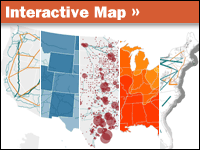 The Grid May Be Smart, But Will It Also Be Green? (Part 6)The sixth of a 10-part series Apr 29, 2009 - Richard Harris - npr.org
The push is on to make the nation's aging electricity grid smarter, so it can handle growing demand for electricity. Many assume that a smart grid will also be a green grid delivering clean electricity and helping to address climate change. But that's not necessarily so. Giving the grid a brain doesn't necessarily mean it will make green decisions. Likewise, the big push to expand the electric grid into areas rich in renewable energy doesn't guarantee that the new, improved grid will be more climate-friendly. Smart grid technology means several kinds of innovations. One is that both customers and utilities will be able to monitor electric use, minute by minute. Steve Nadel, who runs a nonprofit called the American Council for an Energy-Efficient Economy, says information alone doesn't make the smart grid green. " As a friend of mine says, a smart grid needs smart programs needs smart rates," Nadel says. Smart programs could, for example, help people see how they're using electricity so they can find painless ways to conserve. And smart rates could create incentives for people to save electricity, by charging more at some times and less at others. In principle, cheaper energy should encourage environmentally friendly objectives. But Nadel says not all smart grid experiments make green sense. "Some utilities have programs to encourage nighttime lighting," Nadel says. "Gee, make your house look beautiful. Make it more secure. Light up like Times Square or something. That's an example. And don't worry, it's only 2 cents a kilowatt-hour. We'll give you a special nighttime discount." In some cases, people use not only more energy, but dirtier energy, too. That's because in some parts of the country, nighttime electricity often comes from coal-fired power plants. They're usually the cheapest source, so they are used first. When demand is higher during the day, the additional electricity is more likely to come from cleaner natural gas. So in parts of the country that rely heavily on coal power, nighttime energy means dirtier energy. Nadel says the good news is that smart grid pilot programs so far have largely encouraged conservation. "Some of them have saved quite a bit of energy," he says. "Some have built some load. The devil is always in the details." Clean Energy Transmission Lines? Details also bedevil another feature of the expanded, smarter grid new transmission lines. In California, San Diego Gas and Electric has been pushing to build a major new power line into the neighboring Imperial Valley. The utility has been selling the idea in part on its environmental benefits. But California Public Utilities Commissioner Dian Grueneich is skeptical. "Anybody who's proposing a transmission line in the United States these days is going to claim it's going to be used for renewable it's going to be a 'green' line because that's mom and apple pie," Grueneich says. During the public utilities commission's hearings about whether to approve the Sunrise power line, San Diego Gas and Electric said the project would bring huge amounts of clean solar and geothermal energy into San Diego. The utility was basing its arguments on clean energy sources it hopes will be developed in the Imperial Valley in the coming years. But Grueneich says hopes and aspirations are a lot different from legally binding commitments. "Existing contracts that SDG&E had signed from this area, the Imperial Valley, would only fill up 20 percent of the line," she says. "And that means the other 80 percent of the power that flows over this line could easily would likely flow from coal-fired power plants elsewhere in the Western United States." The commission voted to approve the line, anyway. Grueneich cast the only "no" vote. She says this sort of debate is likely to play out nationwide as power companies bid to string new lines while expanding and strengthening the electric grid. Power company investors will make a profit no matter what kind of electricity the lines carry. So Grueneich favors new laws requiring power companies to buy a lot of green electricity. "This isn't rocket science. We don't need to develop whole new technologies," she says. "We aren't making bets on will we be able to develop a whole new way of doing things. It's just really being serious. If we're going to spend this money and call something green, let's make sure it happens." And that comes down to politics. Indeed, bills are winding their way through Congress that would help ensure that the smart grid is also green. |
